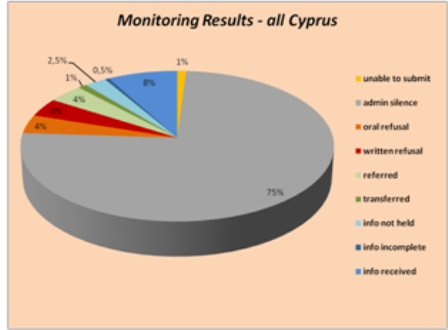The Open Cyprus Project launches its Report: access to information is the exception and silence the rule in Cyprus.
24 February 2011, Nicosia/Madrid: With a level of 75% of administrative silence in response to information requests, public bodies across the island are violating the public’s fundamental right to know according to the Open Cyprus Project.
The largest ever monitoring of access to information in Cyprus found systematic breaches, in particular the non-responsiveness of public bodies resulting in 72% administrative silences in the Republic of Cyprus and 78% administrative silences in the northern part of Cyprus. Of the 393 requests submitted to 20 public bodies, only 8% of resulted in full provision of information: 7% in the Republic of Cyprus and 9% in the northern part of Cyprus.
The research carried out in 2010 led to many findings and recommendations which are presented in detail in the body of the report. Below you will a summary of the eight key findings of the research, along with recommendations.
ONE
Finding: The right of access to information is guaranteed in constitutional provisions on freedom of expression but the legal framework is seriously flawed, with no law on access to information in the south and a law that falls below Council of Europe standards in the north.
Recommendation: Bring the legal framework into line with the Council of Europe Convention on Access to Official Documents, including by adopting an access to information law in the south and/or reforming all relevant legislation in the north/south.
TWO
Finding: Systematic violations of the fundamental right of access to information island-wide with 75% administrative silence in response to requests for information.
Recommendation: The government should ensure that the public authorities respond to requests by providing comprehensive information within a reasonable time frame. To this effect they should adopt the necessary legal mechanisms and train all officials in the public’s right to know.
THREE
Finding: Three quarters of people in Cyprus believe that they have a right of access to information according to the Opinion Survey conducted under this project. Only around one in three respondents agree that public authorities in Cyprus are open and trustworthy. Over half of respondents stated that, in practice, access to key documents is not possible.
Recommendation: In addition to ensuring that there are access to information laws which function in practice, the government has an obligation to inform the public of their right of access to information, including through public education campaigns on how to file requests, how to appeal refusals and silence, and where to find proactively published information.
FOUR
Finding: Many public bodies do not appear to have information officers nor to have provided full contact information on their websites or in other public materials.
Recommendation: Ensure that in each public body there is an official responsible for responding to the public’s requests for information and for the proactive publication of key classes of information. Ensure that full contact information for this person is published.
FIVE
Finding: There is no Information Commissioner or similar body responsible for oversight of the right to information and for receiving complaints from members of the public. In the north the Access to Information Assessment Commission foreseen by the law has not been appointed.
Recommendation: Ensure that the future access to information law in the south establishes an Information Commissioner fully empowered to promote and protect the right of access to information. Appoint the Access to Information Assessment Commission in the north and give it full powers to enforce the law.
SIX
Finding: The research found very poor levels of proactive publication on the websites of public authorities. Monitoring of 20 public bodies across the island found that in the south only 36% and in the north only 13% of core classes of information were available. Information is usually available in only one language.
Recommendation: Ensure full proactive publication of information about the structure, policies, functioning, and budget of each public body is available in multiple languages. The information should be presented in a way that is comprehensible to members of the general public, and should be published both on websites and using other media.
SEVEN
Finding: The websites of public bodies particularly lack financial information such as projected budgets and actual expenditure, details of public procurement processes being run by that public authority and updated information on contracts issued. This was confirmed in interviews with civil society organisations.
Recommendation: A particular effort should be made to ensure the publication of key financial information on the websites of each public authority. This information should be comprehensive and detailed. It is essential for the fight against corruption that public procurement, subsidy, and contracting processes are fully transparent.
EIGHT
Finding: There is a lack of information about public consultations which indicates that there is a very low level of involvement of members of the public in public decision making across the island. This was confirmed, in particular, in the interviews conducted with civil society representatives.
Recommendation: There is a need to open the doors of government to the public, including by establishing frequent public participation mechanisms throughout the policy making process. Information about the opportunities to engage in decision making should be widely publicised including via public body websites, ensuring that all necessary background information is made available.

